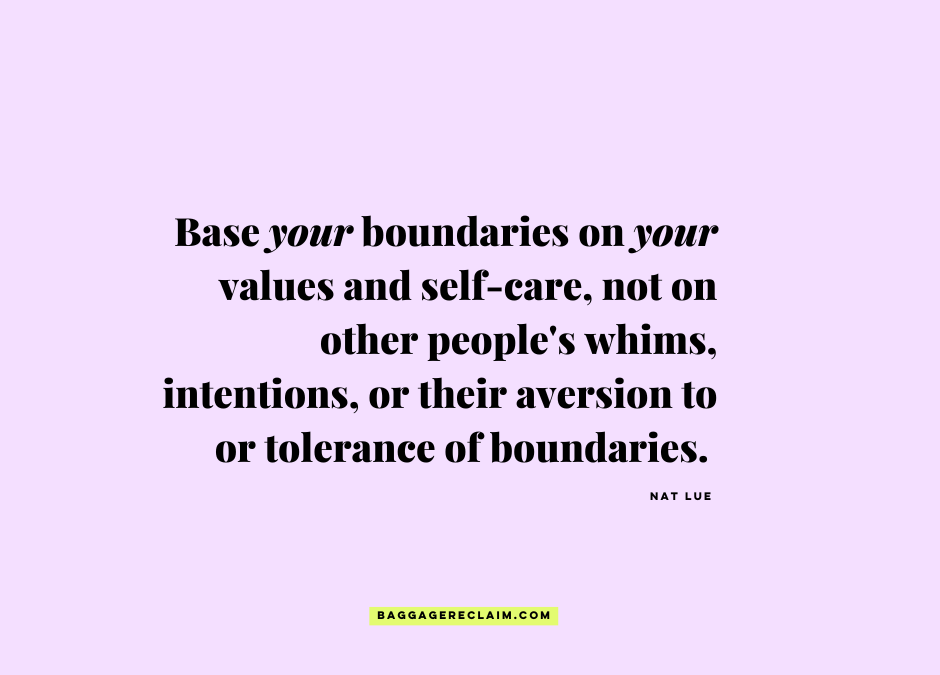The more I talk to people about healthy boundaries, the more I see that many of us humans are hung up on being perceived as well-meaning. So we avoid creating healthy boundaries that we think will make us look bad. We also wrestle with ourselves about conveying our boundaries about something due to believing that the person or people involved are ‘well-meaning’. In fact, as soon as someone says something like “I know they mean well”, I fear for them. I know it will become their source of pain over the coming days, weeks and months.
We find it hard enough to create boundaries with shady folk. This is especially so with the ones who keep telling us that their unwanted behaviour is for our “own good” or a sign of how much they care about or love us. Side note: it’s not.
When we’ve decided that someone is ‘nice’ and ‘well-meaning’, we will often opt to suffer it out. We don’t want to hurt their feelings, appear ungrateful or pee on their parade. Sometimes we afear being impolite or being perceived as unprofessional. We then project good intentions on a person and decide that it’s a reason to stay silent in words and actions. We also have a fear of looking like we are not a well-meaning person. This comes from mistakenly believing that voicing our boundaries reflects ill intent.
But we don’t need to decide whether or not we can have boundaries based on whether someone ‘deserves’ it. This kind of mentality suggests that boundaries are only for Bad People or those we’ve decided can ‘handle it’.
Our boundaries are based on who we are—our needs, desires, values, and expectations–not on other people’s seeming intentions or whims. Or their aversion or tolerance of healthy boundaries!
Also, our idea of ‘well-meaning’ is based on the associations we’ve learned earlier in life. This includes whatever we’ve absorbed about Good and Bad People, forgiveness, saying no, and giving second chances.
Each time we’re in a situation where we could and need to have boundaries but opt not to, our reasoning and what we do and don’t do next is our emotional baggage.
The truth is, avoiding boundaries by saying people are well-meaning helps us avoid being honest with ourselves about who we really are. We see our behaviour and what can be our murky boundaries as us being ‘nice’ and ‘well-intentioned’ instead of recognising how much pain we’re in. It also means we don’t have to acknowledge where we’re overstepping other people’s boundaries.
Your recognition and choice to have healthy boundaries isn’t a judgement on the other person–it’s respect. Also, if this person is so flippin’ well-meaning, surely you can bring up whatever the issue is or show yourself more clearly with updated boundaries? The fact that you can’t or won’t bring it up despite your vouching for their intentions speaks volumes about your relationship.
Is it that you can’t bring it up, which throws a monkey wrench in the works over this whole ‘well-meaning’ thang? Or is it that you could have healthier boundaries but are afraid? Be honest with yourself.
Keep in mind, also, that people cannot know where they stand with you if they’re unaware of your boundaries. In an environment where everyone toes the party line and avoids speaking up–e.g. work–it reinforces the problem and fosters resentment. Intentions don’t outweigh impact.
When you hear yourself rationalise that someone “means well”, halt. What are you denying about the situation? Where are you ignoring yourself? What are you avoiding saying or doing?
The Joy of Saying No: A Simple Plan to Stop People Pleasing, Reclaim Boundaries, and Say Yes to the Life You Want (Harper Horizon/HarperCollins) is out now and available in bookshops on and offline. Listen to the first chapter.

 Add to favorites
Add to favorites 
